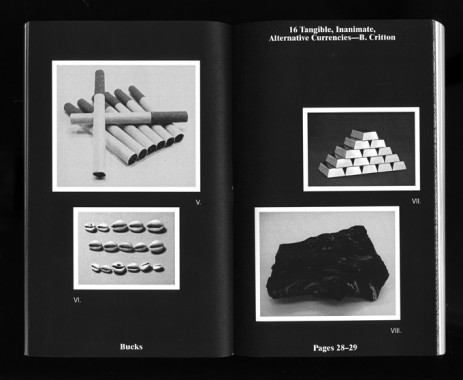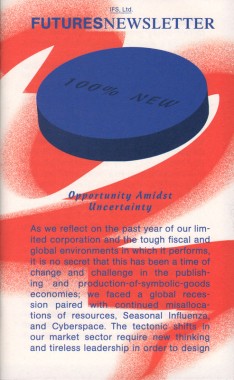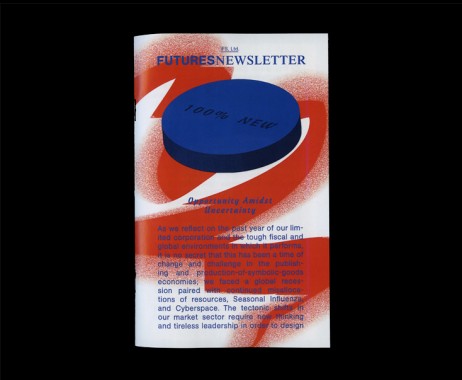The Book Trust Prospectus
The Book Trust Prospectus
Edited by Benjamin Critton, Harry Gassel, Brendan Griffiths, Zak Klauck and Mylinh Nguyen
Softcover, 160 pp., offset 1/1, 4.25 x 7 inches
Edition of 500
ISBN 978-1-928570-15-8
Published by IFS, Ltd.
$19.10 ·
The Trust and the accompanying Book Trust Prospectus address matters of micro-economy and distribution, as well as prescribed versus perceived value. The project suggests a new currency specific to the setting of the Book Fair, a context in which a distinct set of commodities is exchanged by like-minded vendors in a finite space and time. It is only in this setting that a book could be posited as capital — a literal stand-in for the money that commonly exchanges hands at the Fair. Perceived worth is thus no longer dictated by edition or price, but instead by a trader’s subjective notion of the values they assign each book.
Over the three days of the Fair, the book, produced in a fixed quantity of 500, varied in value as each negotiation determined and redetermined its worth in the marketplace. With each transaction, the Prospectus assumed the value of the book for which it was exchanged. The traded commodities now comprise The Book Trust — a value-appreciating book bank. By trading with IFS, Ltd., participants acquired a single theoretical share of the bank, the Prospectus acting as a document of that transaction. In framing the project in a format similar to that of a stock exchange, IFS, Ltd. hopes that the Trust emphasizes the tenuous, abstract value of the book: as a designed object, as a medium for content, as a traded commodity, and as a symbol of participation in the project itself.
Prospectus
The Book Trust Prospectus is, in non-equal parts: a local currency, a stock prospectus for The Book Trust, an exploration into the nature of small-scale publishing and its presence at the NY Art Book Fair (R. Giampietro), a survey of precedented alternative currencies (B. Critton), a platform for hyperbolic re-representations of anonymous fiat money (R. Rozendaal), a foray into corporate branding and rebranding (Metahaven et al.), a proposal for a time-based repurposing of existing banknotes (N. Hirsch & Z. Kyes), an analysis of the current state of [art] book-publishing and -design (L. v. Deursen et al.), a venue for research into non-essential commodity futures like tulips and Beanie Babies™ (H. Gassel), a profile of independent art book vendors (Golden Age), and a podium for experimentation with anti-counterfeiting guilloché renderings (B. Griffiths & Z. Klauck). It is the story of its own making and financing as well as an evaluation of the context in which it was made and financed. The Prospectus is a 160-page, perfect-bound, one-colour book, offset-printed in an edition of five hundred by GHP printing in West Haven, Connecticut, USA.
Alexander Rives, Art, Benjamin Critton, Brendan Griffiths, Business, Design, Distribution, Golden Age, Harry Gassel, IFS Ltd., Linda van Deursen, Metahaven, Mylinh Nguyen, Nikolaus Hirsch, Rafael Rozendaal, Rob Giampietro, The Book Trust, Typography, Yale University School of Art, Zak Klauck, Zak Kyes
IFS, Ltd. Futures Newsletter
IFS, Ltd. Futures Newsletter, Opportunity Amidst Uncertainty
Softcover, 28 pp., offset 4/4, 110 x 175 mm
Edition of 6000
Published by IFS, Ltd. / Graphic Magazine
free* · out of stock
*free copy with each order
Investment Futures Strategy, Ltd. (United States) in partnership with GRAPHIC magazine (Korea) is pleased to introduce Futures, a semi-official newsletter published as a stand-alone supplement to GRAPHIC #17 (”When Design Becomes Attitude”). In lieu of a traditional contribution, IFS, Ltd. has chosen to use the GRAPHIC platform to continue its experiments in trade and publishing.
The Book Trust Prospectus examined new possibilities for funding, trade value, and distribution by attaching a different kind of significance to the object, thus short-circuiting the expected monetary transaction. Production of the Prospectus, however, relied on labor-intensive methods that required hours of input for a relatively small output. With the Futures newsletter, IFS, Ltd. has hybridized the positive aspects of large-scale corporate publishing — economies of scale or large print-runs, distribution of labor, and maximum efficiency — with the dictatorial authorship afforded by self-publishing. This new model maximizes potential as authors and designers while minimizing the opportunity cost of production and distribution.
Within the logic of IFS, Ltd. Futures will also act as a form of currency: readers can use their copy of the newsletter to trade for a copy of the Book Trust Prospectus. These recirculated copies of Futures will then be re-made available as a way to generate revenue for a future, freely distributed, as-yet-undefined project thus continuing the self-sustaining eco-system of publishing and distribution, one in which readers and producers collaborate to generate and circulate content outside of the cost-prohibitive channels of traditional publishing.
Art, Benjamin Critton, Brendan Griffiths, David Horvitz, Design, Distribution, Futures Newsletter, Graphic Magazine, Harry Gassel, IFS Ltd., Interview, Jonathan Maghen, Lauren Francescone, Lim Kyung Yong, Mylinh Nguyen, Na Kim, Nanette Sullano, Phil Chang, Rafael Rozendaal, Sean Dockray, Textfield, The Book Prospectus, Zak Klauck
IFS, Ltd. Futures Newsletter
The Book Trust Prospectus examined new possibilities for funding, trade value, and distribution by attaching a different kind of significance to the object, thus short-circuiting the expected monetary transaction. Production of the Prospectus, however, relied on labor-intensive methods that required hours of input for a relatively small output. With the Futures newsletter, IFS, Ltd. has hybridized the positive aspects of large-scale corporate publishing — economies of scale or large print-runs, distribution of labor, and maximum efficiency — with the dictatorial authorship afforded by self-publishing. This new model maximizes potential as authors and designers while minimizing the opportunity cost of production and distribution.
Within the logic of IFS, Ltd. Futures will also act as a form of currency: readers can use their copy of the newsletter to trade for a copy of the Book Trust Prospectus (see: the Prospectus, left). These recirculated copies of Futures will then be re-made available as a way to generate revenue for a future, freely distributed, as-yet-undefined project thus continuing the self-sustaining eco-system of publishing and distribution, one in which readers and producers collaborate to generate and circulate content outside of the cost-prohibitive channels of traditional publishing.
The IFS, Ltd. Futures Newsletter is, in non-equal parts: a corporate bulletin, a speculative trading instrument, an experiment in memetic and symbiotic publishing, an internal-external analysis of company performance (B. Critton, H. Gassel, B. Griffiths, Z. Klauck, M. Nguyen), a proposal for an allegorical Escape Act (S. Dockray), a bid for a series of six activities (D. Horvitz), an abridged catalogue of semi-fictional gemstones (L. Francescone), a profile of independent art book distributor (Textfield, Inc.), and a self-reflexive / -reflective cartoon caption contest (R. Rozendaal).
Benjamin Critton, Brendan Griffiths, David Horvitz, Design, Futures Newsletter, Graphic Magazine, Harry Gassel, IFS Ltd., Interview, Jonathan Maghen, Lauren Francescone, Lim Kyung Yong, Mylinh Nguyen, Na Kim, Nanette Sullano, Phil Chang, Rafael Rozendaal, Sean Dockray, Textfield, The Book Prospectus, Zak Klauck


